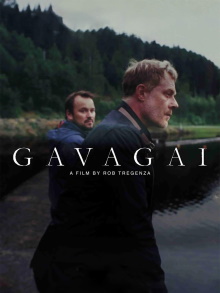
This is a rather obscure film, set in Norway and with dialogue in English, Norwegian and a smattering each of Mandarin and German. Yet the director Rob Tregenza is American. It’s also meant as a showcase for the poetry of Norwegian poet Tarjei Vesaas which limits its potential audience even more. Though it’s a beautiful film and I’m receptive to its message, my unfamiliarity with the poetry makes it difficult to forge a strong emotional connection with it.
A man, Carsten, arrives by train in a rural region of Norway. He is patently unfamiliar with the area and does not speak Norwegian. He finds a local man, Niko, who runs safari tours for elk and offers him a great deal of money to be his driver. He keeps asking to be brought to small, out of the way places with nothing in particular there and does nothing other than spend some time there, which makes Niko very curious. Carsten however is haunted by the spectre of a woman dressed in a Chinese opera costume, though no one else can see her. When pressed, he eventually reveals to Niko that his wife was working on translating the poetry of Tarjei Vesaas to Chinese but fell sick and passed away before she could complete her project. Meanwhile Niko himself is dealing with love troubles of his own and his time with Carsten seems to put him into a self-reflective mood that prompts him to do something about it.
It’s quite obvious early on that this falls squarely into the genre of quiet, contemplative films that seeks to evoke a poetic effect on the audience. We usually love these but Gavagai seems to deliberately shy away from pure visual beauty and expansive shots of the landscape even though it’s set in a beautiful locale. As my wife notes, it very much wants to focus only on the characters and so doesn’t want even the scenery to distract the audience from their state of mind. It also has an understated, deliberately casual style that is much more naturalistic than similar films that try to infuse every scene with momentous import. Its heaviest moments are when Carsten sees the spirit of his dead wife which are every bit as chilling as you can imagine, even when she appears under the full light of day. The result is that it doesn’t reach for the sublime in the way that other similar films do, but it does feel very intimate.
Unfortunately all this is inextricably tied to the poetry of Tarjei Vesaas and most of the spoken dialogue in this film are in fact lines from his poems. I’m sure the effect must be electric for those who are familiar with his body of work but to those who are not, it’s difficult to encounter them for the first time here and be capable of internalizing what is meant, never mind reconciling it with what is happening in the film. There’s at least one scene, the sauna one, in which the intent of the poem is so obvious and so clearly tied to what happens visually that you get it instantly and that’s great. But that usually isn’t the case and without more time to process the lines, it just comes across as generic rumination that fails to truly connect with the audience.
What this means is that this is a film that I would love to love but I don’t because I’m just not familiar with the poetry that is referenced. There’s still plenty in here that we can appreciate and it is a fantastic portrayal of the grieving process so it might be worth your while to watch it.